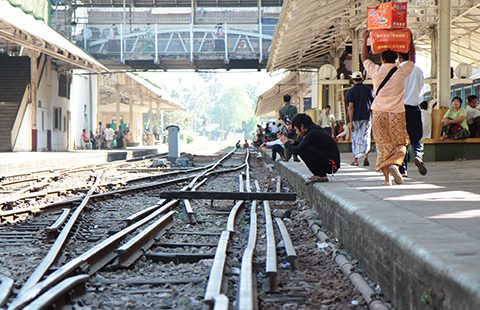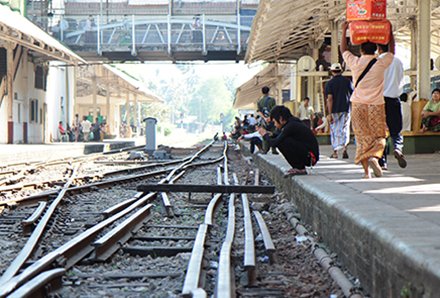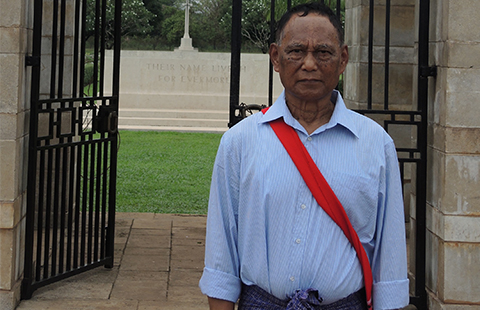Myanmar’s returning diaspora are anticipated yet still hesitant.
Since Myanmar opened up under the semi-civilian government in 2011, the diaspora have been encouraged to return.
As persecution on the basis of political activity or ethnicity is often the reason they left, many are reluctant to return permanently to what is an unclear political situation. As a result, brief stays are common. After so many years away from home, family and friends, it is difficult to image the experience of returning.
Twenty-four years after leaving his home for a new life in Australia, Saya Nai Tin Aye, my Burmese teacher, applied for a tourist visa to return to Myanmar. The process took longer than it does for regular tourists, as the Home Affairs, Foreign Affairs, and Immigration ministries must approve the application. It so happened that my trip to Myanmar would coincide with his. He invited me to visit his home village.
Nai Tin Aye, once president of the Australia Mon Association, is a softly spoken man, with a keen interest and knowledge of history. He has an inspiringly fastidious memory for dates. He left his home in Kawkareik Township, Kayin State in 1991. Formally a star volleyball player and school principal, he was well known and liked in the area. He also spent eight years in the armed resistance, living in the jungle and resisting the Tatmadaw (Burma Army).
In the 1990 elections, Nai Tin Aye worked for a local Mon politician. A warrant was issued for his arrest after authorities alleged irregularities in the campaign accounts. He fled to Thailand, registered with the UNHCR and was resettled in Australia in 1996. Between living in the jungle, Thailand and Australia, he has been away from his wife and three children for over 30 years.
Arriving in Nai Tin Aye’s village I was at somewhat of a loss; the place was considerably larger than I had expected, and I did not know the address. I hadn’t been able to make a telephone connection from Yangon. The motorcycle taxi driver who had reluctantly driven me out here suggested retiringly that I spend the night in a nearby town instead. We approached a group of men in a teashop, and our concerns eased. They had no doubt it was the Sayar Gyi (“principal” or “great teacher”) who we were looking for, and escorted us to his home.
Nai Tin Aye emerged from the house, happy that I had accepted his invitation, and relieved I had arrived despite not calling earlier in the week. He had been there two weeks already, and was evidently comfortable back home. In his longyi and shirt he switched between Mon, Burmese and English as he greeted us all. The house was concrete, with floorboards, a change from the bamboo huts he had left there.
Touring the village, an old friend approached for a chat, held hands with Nai Tin Aye and walked with us. They had been classmates in the village some 60 years ago. In the evening we ate soup and chicken curry, before retiring to watch the television, with Nai Tin Aye seated central to the scene. Before long, a blackout brought complete darkness to the neighbourhood, a regular occurrence. In a candle-lit discussion it was clear that Nai Tin Aye felt no discomfort, despite the differences from Canberra.
The ease of our journey reflects substantial changes in Myanmar, and makes it evident that the conditions for Myanmar people have improved in this short decade. As a former wanted man known for his anti-government activities, Nai Tin Aye could not have imagined returning to his country even five years ago. Old friends he met in his village said they thought they would never see him again. Free to travel through Kayin and Mon states, Nai Tin Aye was surprised at how much the villages have developed since 1991, and how crowded the roads have become.
In August 2011, the new quasi-military government began encouraging the diaspora to return home. The brain-drain which occurred after the 1962 military takeover meant that Myanmar lost many of its brightest and best-educated. It is not known how many more fled the country after the 1988 crackdown.
Both the government and diaspora are confident that the community can contribute to the political transition. Of course, the situation is complicated. Many have settled with families overseas. Furthermore, the procedure for permanent return is unclear, and the uncertainly is compounded by the uncertain political situation. While acknowledging improvements since 2011, many overseas Burmese are reluctant to return to what may be a precarious situation. Nai Tin Aye and others say they will consider returning once their status is transparent.
Throughout the three days I spent with Nai Tin Aye and family, I was struck by how proud he was. He walked tall, and his age and stature elevated him. He was proud to be back in the home he spent most of his life working and fighting for. Despite the overwhelming welcome he received, he remained humble, if confident and comfortable. I sensed his homecoming was relieving. It was also fulfilling, and he is proud of his work for change in Myanmar.
“To see my family and old friends again made me very happy,” he told me. “Now, my plans are to return for another visit in 2017. If the situation is clear, I will think about returning to live.”
The numerous sites around Mon State we visited included the famous Kyaikhtiyo Pagoda (on the Golden Rock), and the waterfront monastery of Kyaikkami, said to contain 11 Buddha hair relics. We ate with friends and family and stopped frequently for sweet Burmese tea. Each meal was preceded with a healthy serve of fish paste – something Nai Tin Aye had evidently missed considerably.
This was the first pilgrimage Nai Tin Aye had made to Kyaikhtiyo, the jewel of Mon State. After a long journey with family and friends he sat peacefully and content at the Golden Rock. He mediated, cross-legged in silence. On his trip to the pagoda he had this to say; “the first time, and, I think, the last time.”
He hopes however, to return home again.
James T. Davies is a PhD candidate at the University of New South Wales, Canberra.
 Facebook
Facebook  Twitter
Twitter  Soundcloud
Soundcloud  Youtube
Youtube  Rss
Rss 

